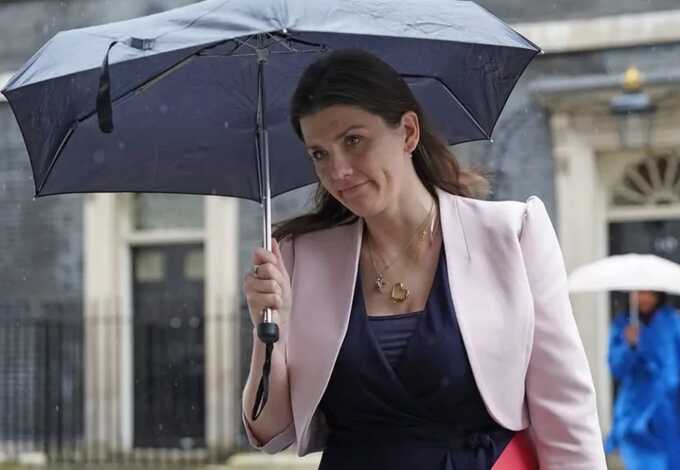Michelle Donelan’s libel bills cost taxpayers £34,000
Legal bills paid by the taxpayer after Science Secretary Michelle Donelan falsely accused an academic of extremism came to more than £34,000.
The department had already confirmed £15,000 had been paid in damages to Professor Kate Sang.
New figures show £19,000 in extra costs - more than doubling the final bill.
The government has defended using public money to pay the bill, claiming her comments had been made "in the course of her ministerial duties".
However, Labour’s shadow science secretary Peter Kyle said the total bill was a "slap in the face to hardworking families".
"Instead of trying to cover up the true cost of her actions, Michelle Donelan should have had the decency to pay the money back to the taxpayer."
Liberal Democrat deputy leader Daisy Cooper also urged the minister to cover the cost herself adding: "People’s taxes should not be used to bail out disgraced Conservative ministers."
Prof Sang, who works at Heriot Watt University, took legal action after Ms Donelan accused the academic of sharing "extremist views"and expressing sympathy for Hamas after the 7 October attacks against Israel.
In a letter to UK Research and Innovation (UKRI), Ms Donelan expressed her "disgust and outrage" about the views of the academic, who sat on an advisory board at the organisation.
The minister cited a social media post in which Prof Sang had said "this is disturbing" alongside a Guardian article about a government crackdown on support for Hamas in the UK.
Ms Donelan later said she accepted that the comment was about the Guardian story as a whole, and not just the headline.
In a statement she said she had "misunderstood" the post and fully accepted the academic was "not an extremist, a supporter of Hamas or other proscribed organisations".
Prof Sang said she was "delighted that this matter has now concluded, but very disturbed by the way in which Michelle Donelan and UKRI behaved".
Following the minister’s letter, the UKRI launched an investigation which found no evidence Prof Sang had expressed extremist views.
A freedom of information request made the Research Professional News website found that UKRI’s investigation cost £23,280.
In March, Labour’s Peter Kyle wrote to Sarah Munby, the permanent secretary at the science department, asking for the overall cost of the legal fees.
He also asked why she considered using taxpayers’ money to foot the bill was justified and whether she consulted anyone before approving the payment.
In a reply - first reported in the Guardian - Ms Munby said it was "established practice" that ministers are "indemnified by the Crown for any actions taken against them for things done or decisions made in the course of their ministerial duties".
"This reflects the important principle that ministers should be able to carry out their official duties in the way that they see fit, without the risk of personal liability constraining their ability to take those official actions."
In the case of Prof Sang, Ms Munby said the minister had been writing to a body over which she had oversight and that the letter, in which she made accusations against the academic, had been published "following the usual clearances".
She said that when proceeding with the payment to Prof Sang the department had taken "specialist advice" and were advised that the "the actions were properly viewed as having been taken by the Secretary of State in the course of her ministerial duties".
"In such circumstances, agreeing the £15,000 settlement without admitting liability was intended to reduce the overall costs to the taxpayer that could result from protracted legal action for the government."
The civil servant confirmed that in addition to the £15,000 paid to Prof Sang, the costs incurred by the Government Legal Department were £7,785.30 and that fees for external counsel amounted to £11,600.
Read more similar news:
Comments:
comments powered by Disqus


































